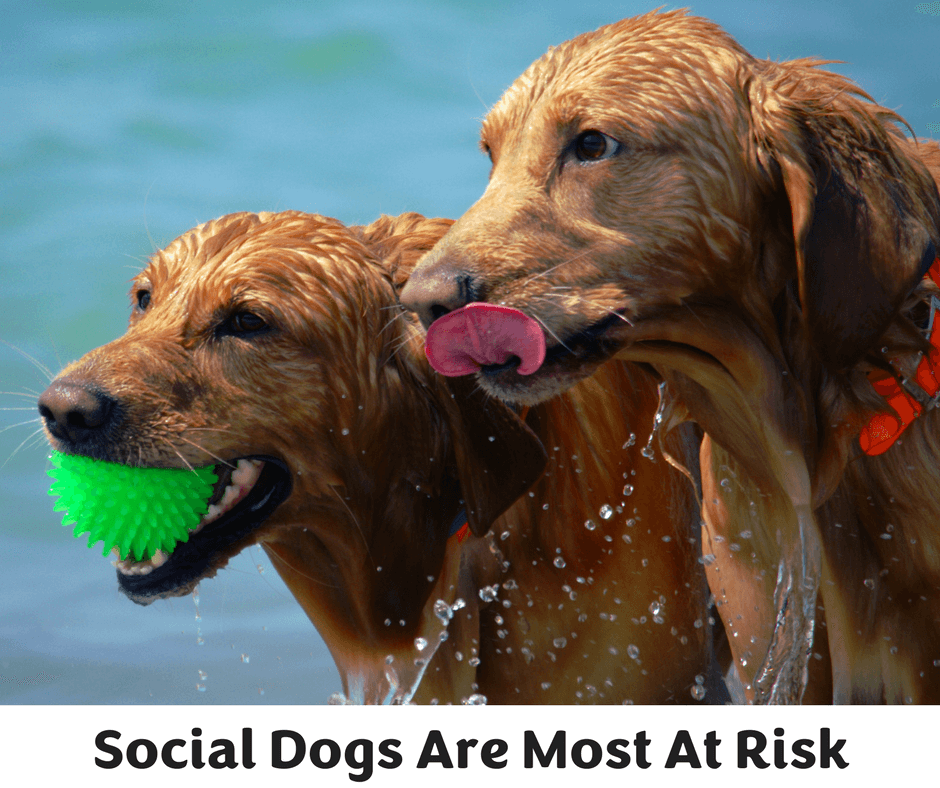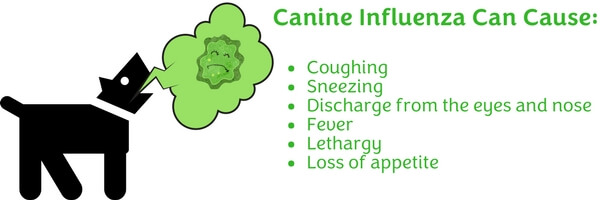Canine Influenza Virus (CIV)
Seattle Veterinary Associates Recommendations
At Seattle Veterinary Associates (SVA) we feel that it is our responsibility to be conservative with vaccinations and counsel each client on their pet’s individual risk of exposure. We then customize the most appropriate vaccination protocol based on your pet’s lifestyle and environmental exposure risks. To date, we have not routinely recommended the Canine Influenza Virus (CIV) vaccine based on the very limited presence of the disease in Washington. However, due to the recent epidemiological trends on the west coast, we are now recommending the CIV vaccination for any dog that poses a risk for exposure.
 These patients are generally the same group of dogs that we recommend receive the Bordetella (“kennel cough”) vaccination. Just like Bordetella, dogs that have contact with groups of other dogs are at higher risk for exposure to CIV. Lifestyle factors include any congregation of dogs; boarding and daycare facilities, dog-friendly workspaces, dog parks, and grooming parlors. Immunocompromised pets, such as juveniles, geriatrics, patients with immune-mediated disease and cancer may be at an increased risk of developing more severe symptoms.
These patients are generally the same group of dogs that we recommend receive the Bordetella (“kennel cough”) vaccination. Just like Bordetella, dogs that have contact with groups of other dogs are at higher risk for exposure to CIV. Lifestyle factors include any congregation of dogs; boarding and daycare facilities, dog-friendly workspaces, dog parks, and grooming parlors. Immunocompromised pets, such as juveniles, geriatrics, patients with immune-mediated disease and cancer may be at an increased risk of developing more severe symptoms.
CIV has caused respiratory disease in dogs throughout much of the country over recent years. Two different strains of the virus have been identified; the first subtype, H3N8 (equine origin), originated from Florida in 2008 and radiated throughout most of the country. The most recent strain of influenza, H3N2 (avian origin), originated in Korea, China, and Thailand in 2007/2008 and then emerged in the Chicago area in March of 2015. Shortly after its arrival in Chicago, there were approximately 1,000 cases documented in the metropolitan area and the disease then spread to over 20 states in a matter of months. In early February 2016, there was a small outbreak in a south Puget Sound shelter that was quickly eliminated through quarantine. Since its introduction, H3N2 has had a consistent presence in the Midwest and Atlantic Coast. However, in late 2017/early 2018 an outbreak of disease has emerged in Northern California that is gaining momentum, and there have been very recent reports from Oregon and Idaho.
These CIV viruses are respiratory in nature and are considered highly contagious. They spread easily in dog populations through muzzle- to- muzzle contact or direct contact with contaminated surfaces and objects. The virus can live for approximately 48 hours on surfaces in the environment and on hands and clothing for up to 24 hours. The incubation period is usually 2–4 days from exposure to onset of clinical signs and it is during this period that infected dogs are most contagious. 80% of dogs exposed to the virus will develop mild clinical symptoms exhibited by a cough lasting 1–3 weeks. Other potential symptoms include sneezing, discharge from the eyes and nose, fever, lethargy, and loss of appetite. Some dogs can become severely ill with a high fever (104º–106ºF), and secondary bacterial infections resulting in pneumonia that may require extended hospitalization and oxygen support. The mortality rate is less than 10% and approximately 20% of infected dogs will remain asymptomatic while still shedding virus for up to 20 days.
 Due to the emergence of the virus in close proximity to Washington, Seattle Veterinary Associates is taking a proactive approach to educate our clients about the disease and risk factors. We will be conducting several vaccination clinics in order to best serve our patients that are at greater risk for coming in contact with the CIV virus. We have the most up-to-date bivalent vaccine, covering both H3N2 and H3N8 strains. For complete immunity, a booster is given 2-4 weeks after the initial vaccination. As with any vaccine, if a vaccinated dog is exposed to the virus, the goal is that the dog will either not develop clinical illness, or the symptoms will be less severe than if the dog had not been vaccinated. No vaccination is ever 100% protective.
Due to the emergence of the virus in close proximity to Washington, Seattle Veterinary Associates is taking a proactive approach to educate our clients about the disease and risk factors. We will be conducting several vaccination clinics in order to best serve our patients that are at greater risk for coming in contact with the CIV virus. We have the most up-to-date bivalent vaccine, covering both H3N2 and H3N8 strains. For complete immunity, a booster is given 2-4 weeks after the initial vaccination. As with any vaccine, if a vaccinated dog is exposed to the virus, the goal is that the dog will either not develop clinical illness, or the symptoms will be less severe than if the dog had not been vaccinated. No vaccination is ever 100% protective.
At Seattle Veterinary Associates, we strive to partner with our clients so that you can make informed decisions about your pet’s health care. Ultimately, the decision whether to vaccinate your dog should be made based on a conversation with your veterinarian. Please don’t hesitate to contact us if you have more questions or concerns about CIV.
More information and up-to-date surveillance is also available by visiting: www.dogflu.com.

